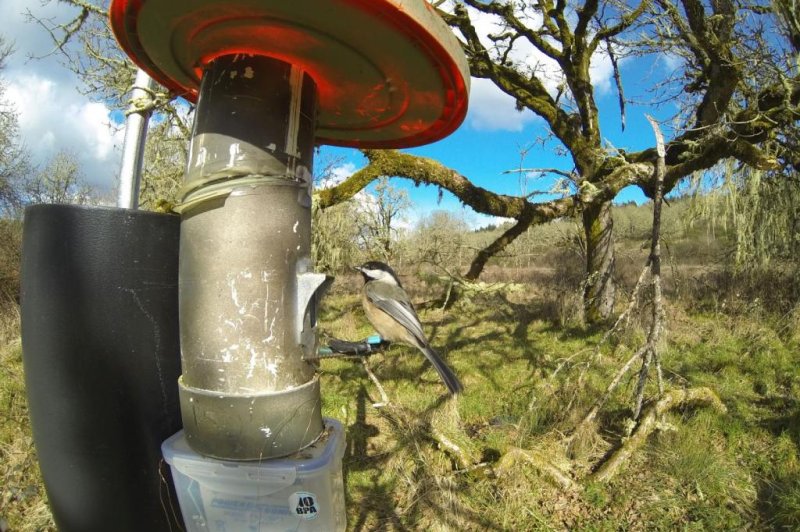A tagged black-capped chickadee visits a bird feeder outfitted with a chip-reader. Photo by Jim Rivers/Oregon State University
June 28 (UPI) -- Bird-lovers can feed their feathered friends guilt-free, according to a new study.
The latest findings, published Monday in the Journal of Avian Biology, suggest small songbirds are unlikely to become reliant on the offerings of backyard bird feeders.
"There's still much we don't know about how intentional feeding might induce changes in wild bird populations, but our study suggests that putting out food for small birds in winter will not lead to an increased dependence on human-provided food," study co-author Jim Rivers, an animal ecologist with Oregon State University's College of Forestry, said in a news release.
Hundreds of millions of people all over the world provide food for wildlife.
The practice has raised concerns that animals might become dependent on human-provided foods, disrupting typical animal behavior.
"The extensive and widespread nature of people intentionally feeding wildlife can have unintended consequences for free-ranging animal populations, and those consequences are best documented in birds," Rivers said. "On the negative side, it can facilitate disease transmission, restructure local communities and alter migration behavior, for example."
"There's even evidence that it can lead to changes to birds' bill structure," Rivers said. "On the other hand, it can also have positive effects, such as enhanced body condition, wintertime survival and reproductive output."
To better understand the ecological and biological impacts of wildlife feeding, researchers studied the feeding patterns of 67 black-capped chickadees that were tagged with radio frequency transmitters.
One third of the tagged songbirds were subjected to significant wing clipping, limiting their range. Another third were lightly clipped. The remaining third, the control group, remained unclipped.
Removing primary feathers makes it harder for birds to fly, thereby increasing the energy costs of flight.
Scientists placed 21 bird feeders throughout a riparian habitat where the birds were captured, tagged and clipped. Each of the feeders were filled with sunflower seeds and outfitted with chip readers to track the visitation patterns of the tagged birds.
Chickadees are an ideal species for wildlife feeding research. The small songbirds require large daily energy inputs, and thus make frequent feeder visits.
They also typically take just a single seed during each visit, making it easier for scientists to quantify and track changes in feeding behavior.
"Our study found that the experimentally handicapped chickadees, those experiencing elevated flight costs, did not increase their rates of visitation to the feeders," Rivers said.
The findings suggest bird feeders are unlikely to serve as a crutch for songbirds, even when environmental conditions are tough.
In fact, scientists found clipped birds briefly reduced visits to local feeders, probably to limit their exposure to predation. After the two-week, post-clipping lull, the clipped and unclipped birds showed similar feeding patterns.
"Feather-clipped chickadees reducing their use of feeders relative to control birds suggests that foods in the environment -- like seeds, berries and small invertebrates -- were sufficiently available to compensate for increased flight costs and allowed them to cut back on feeder use," Rivers said.
"It's clear that the chickadees in our study did not increase their visitation rates nor did they increase their reliance on supplemental feed during a period when they might have benefited from it the most," Rivers said.
Though the latest research suggests bird feeders are unlikely to have negative effects on bird ecology, previous studies suggest they can sometimes provide a lifeline to struggling songbirds.















